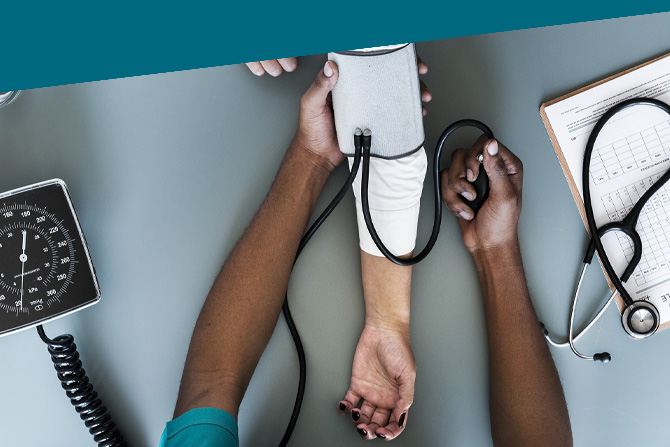Symptoms of High Blood Pressure and What To Do About Them
March 19, 2019

High blood pressure is not a condition to take lightly. And it’s not just for elderly people, either. Moreover, it’s stealthy and often does not show any noticeable symptoms. About a third of people with high blood pressure don’t even realize they have the condition.
That’s why it’s sometimes called the silent killer. It can have serious consequences like heart disease, vascular disease, respiratory disease, stroke, aneurysms and kidney failure over the long term if not treated properly.
How Is High Blood Pressure Defined?
Blood pressure in the arteries is expressed by two numbers. One (systolic) is the pressure when the heart beats or contracts. The other (diastolic) is the lower pressure between those beats. You’ll often hear blood pressure described in shorthand terms like “120 over 80.”
There are generally three levels of hypertension:
- Chronic, defined as greater than 130 mm HG systolic pressure or greater than 80 mm HG diastolic pressure
- Severe, defined as greater than 180 systolic or greater than 120 diastolic
- Urgent, defined as greater than 220 systolic and greater than 120 diastolic
Some sources outline five tiers of blood pressure:
- Normal (120 systolic over 80 diastolic)
- Elevated (120-129 over 80)
- Stage 1 (130-139 over 80-89)
- Stage 2 (140 over 90)
- Crisis (180 over 120)
How Would I Know?
Most people, by far, with mild hypertension never experience noticeable symptoms.
If hypertension does exhibit symptoms, they can include dizziness, shortness of breath, headache and nosebleed. Periodic symptoms like these can also be an indication of temporary changes in your blood pressure.
Symptoms of a more elevated condition can include fatigue, confusion, chest pain, difficulty breathing, irregular heartbeat, blood in the urine and a pounding in the chest, neck or ears.
Severe hypertension or a hypertensive emergency can produce blurred or distorted vision, nausea, vomiting and anxiety. If this happens, especially if the symptoms persist or recur, it’s wise to see a physician quickly since these symptoms could indicate a risk of a serious problem like stroke or heart attack.
If any of these kinds of symptoms of high blood pressure arise quickly and severely, you may even want to consider a visit to the emergency room.
How Can High Blood Pressure Be Treated?
Luckily, hypertension can usually be managed pretty easily.
An “elevated” level of blood pressure can often be addressed simply by lifestyle changes such as a healthier diet, exercise, smoking cessation, weight loss and stress management. Stage 1 may be approached in a similar fashion, but medication may also be considered. At stage 2, medication is likely to come into play.
Common medications that are available to treat the condition include:
- Angiotensin-converting enzyme (ACE) inhibitors
- Angiotensin II receptor blockers (ARBs)
- Calcium channel blockers
- Diuretics (water or fluid pills).
The most reliable way to check your blood pressure is to visit your doctor and measure it with a professional blood pressure cuff. It’s simple, easy and takes just a couple minutes. This test should also be a standard part of your annual wellness exam and provides a way to catch the condition at the onset. If there’s a history of hypertension in your family, make sure your doctor is aware of that.
To prepare for your visit, it’s a good idea to avoid caffeine or cigarettes for 30 minutes prior to the test, go to the bathroom beforehand and sit quietly for about five minutes. Once you have the test data in hand, you and your physician can determine whether treatment, if any, is recommended.
You can also test your blood pressure at home. The American Heart Association (AHA) recommends an automatic, cuff-style upper arm monitor for at-home use.
Blood pressure is one of the basic measurements of health status. At low levels, hypertension is generally not a problem and easily treated. But, at higher levels and/or left untreated for an extended period of time, it can be life threatening. Understanding the symptoms of high blood pressure can help, but the best approach is regular check-ups with your doctor.










